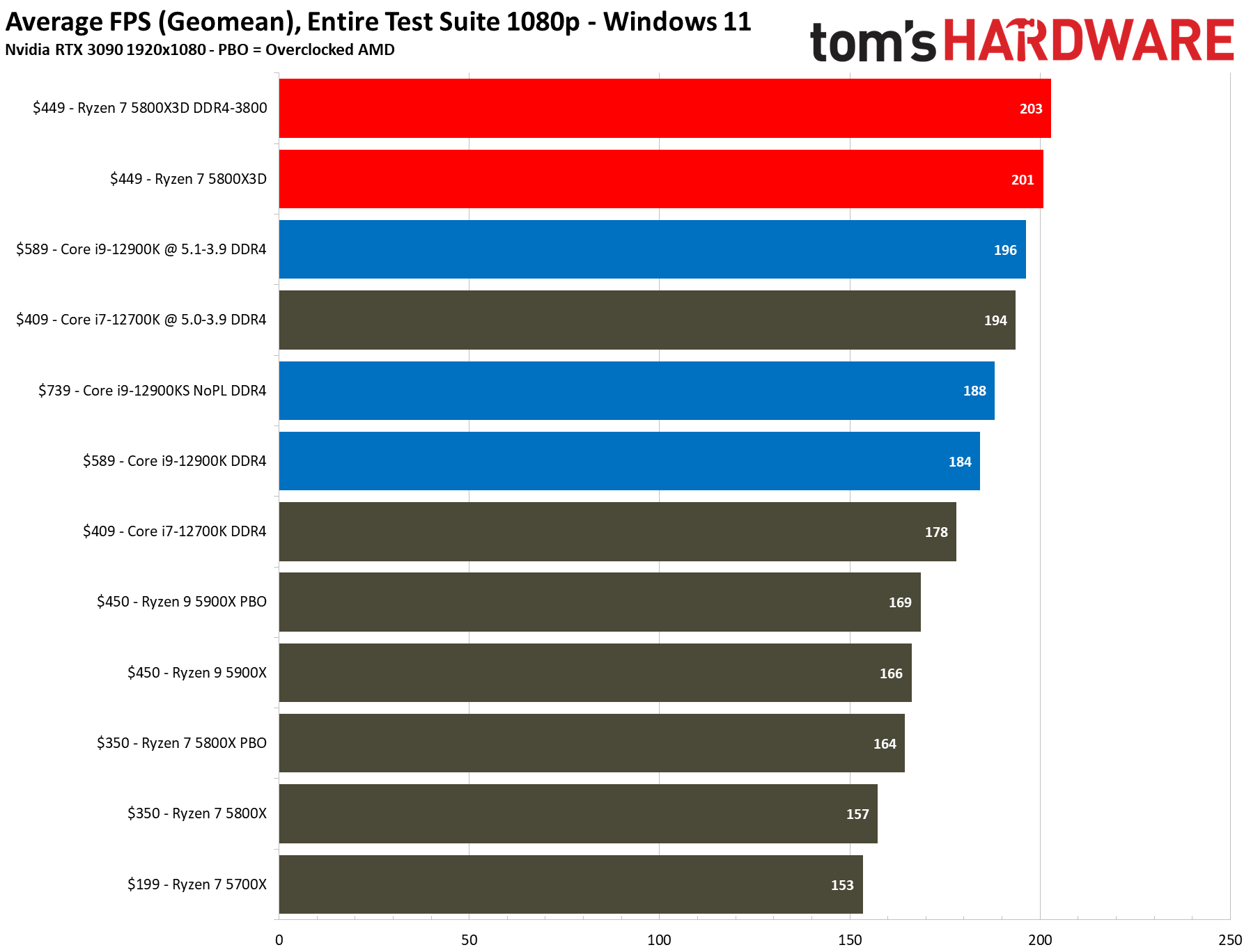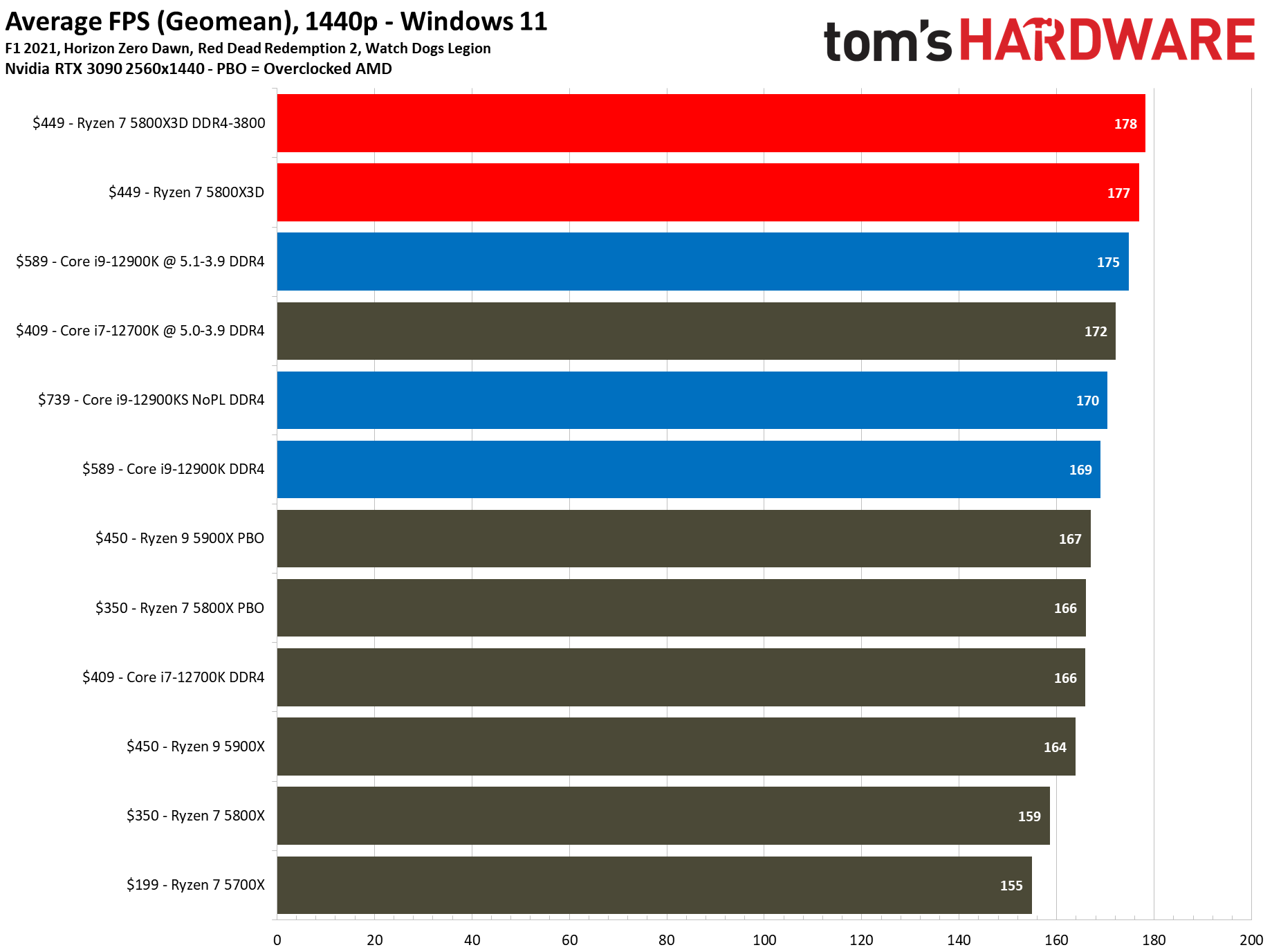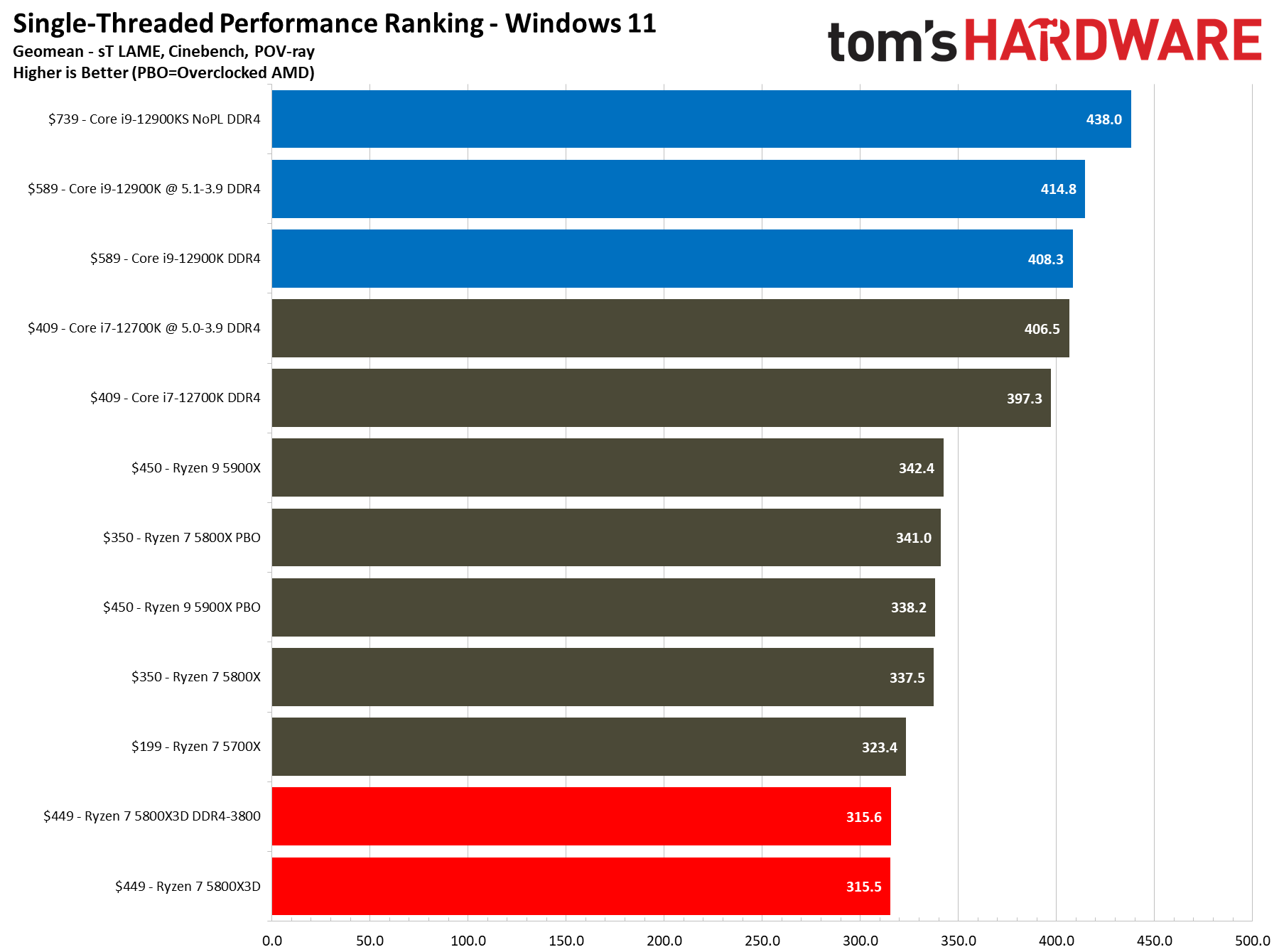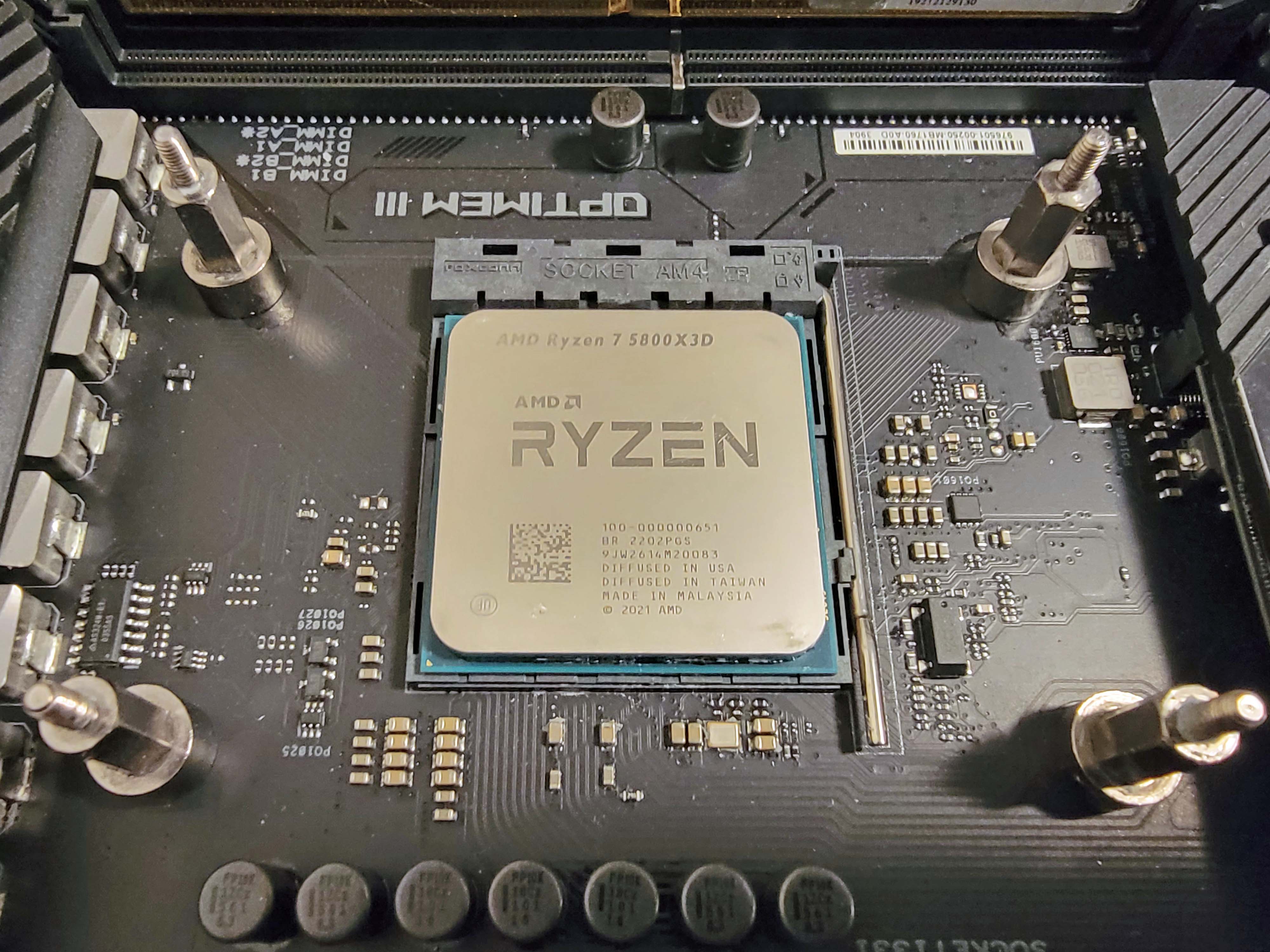Why you can trust Tom's Hardware
The $449 Ryzen 7 5800X3D's 3D V-Cache tech represents an innovative engineering effort that conquered the technical challenges associated with bringing the first desktop PC chip with 3D-stacked SRAM to market, and to great effect. The end result is a comparatively low-power chip that delivers incredible gaming performance, dethroning Intel's $589 Alder Lake Core i9-12900K and $739 Core i9-12900KS from the top of our gaming charts.
The Ryzen 7 5800X3D is a special chip optimized specifically for gaming, but it can't keep pace with similarly-priced chips in productivity applications. The 5800X3D also doesn't support Alder Lake's leading-edge connectivity options, like DDR5 and PCIe 5.0. AMD won't have comparable connectivity until its 5nm Ryzen 7000 ‘Raphael’ Zen 4 CPUs launch later this year.
Below, we have the geometric mean of our gaming test suite at 1080p and 1440p and a cumulative measure of performance in single- and multi-threaded applications. Remember that we conducted the gaming tests with an RTX 3090, so performance deltas will shrink with lesser cards and higher resolution and fidelity settings. However, it is noteworthy that a few of our tested titles are approaching a GPU bottleneck at 1080p, so we might see bigger performance deltas when new, more powerful GPUs arrive later this year.




The 3D V-Cache doesn't accelerate all games, so your mileage will vary. On average in our test suite at 1080p, the 5800X3D is ~9% faster than the 12900K which costs 30% more, and ~7% faster than the Core i9-12900KS which costs a whopping 64% more. The 5800X3D even manages to carve out a 3% lead in the face of the heavily-overclocked 12900KS, making it both the fastest gaming chip in our test suite and a better value for gaming than the Core i9 and Core i7 models.
The 5800X3D also beat AMD's previous-fastest gaming chip, the Ryzen 9 5900X, by 21% in gaming. The 5800X3D does command a sizeable $100 upcharge over the 5800X, but it was 28% faster in our test suite. In fact, despite its lower clock speeds, we didn't see any regressions in gaming with the 5800X3D.
Overall, the Ryzen 7 5800X3D is a great high-performance gaming chip, but its performance characteristics are bipolar when it comes to standard desktop PC applications: The Core i9-12900K is 29% faster in single-threaded work and 62% faster in threaded applications, and the 12900KS is even faster still. Additionally, the Ryzen 7 5800X is 7% faster in single-threaded work, but only 1% faster in multi-threaded applications.
If you're looking for a more balanced chip that does well at both gaming and applications, the $409 Core i7-12700K is a solid choice. The Core i7-12700K is 28.8% faster in single-threaded work and 40% faster in multi-threaded work than the 5800X3D, showing that it is the best all-rounder in this price range. For AMD fans, the $450 Ryzen 9 5900X is also a competent all-arounder, but the 12700K remains a better value.
The 5800X3D drops into existing socket AM4 motherboards dating all the way back to the 300-series that debuted in 2017, so it will make a great high-performance drop-in upgrade for Ryzen owners, provided they have a decent motherboard with solid power delivery and the right supporting components. That upgrade path is even more important given the recent shortages and price hikes we've seen, but it will likely be the last upgrade for socket AM4 platforms. Be aware that AM4 is on the way out to make room for the 5nm Ryzen 7000 ‘Raphael’ Zen 4 chips in the AM5 socket. Should you upgrade or wait for Zen 4? Unfortunately, we can't answer that question yet.
AMD hasn't enabled overclocking the 5800X3D's core frequencies, probably for the reasons we outlined in our thermal throttling tests above, but you can tune the memory and Infinity Fabric. Given the 5800X3D's exceptionally high performance in gaming at stock settings, it might be easy for some to forgive this limitation. It's still a bummer, but not a deal-breaker. Also, be aware that memory overclocking for the 5800X3D is of limited to no utility — the gains aren't slim enough to justify the expense of a higher-end memory kit.
The Ryzen 7 5800X3D has much lower power consumption than the Core i9-12900KS and 12900K, making it a far cooler processor that won't require as expensive accommodations, like a beefy cooler, motherboard, and power supply. We are talking about a chip that peaked at 130W compared to the 12900KS that topped out at over 300W, after all. That means the 5800X3D delivers top-notch gaming performance along with a cooler, quieter, and less expensive system than you'll get with a Core i9.
If you're willing to accept the lower but still competent performance in desktop PC applications, and also do your homework to make sure the Ryzen 7 5800X3D accelerates the types of games you play frequently, it's hard to go wrong with this chip — especially for upgraders. Stepping up from a Ryzen 7 1800X to a drop-in Ryzen 7 5800X3D is a no-brainer, for instance. We're sure that will keep plenty of folks from jumping ship to Intel's Alder Lake or upcoming Raptor Lake processors.
Get Tom's Hardware's best news and in-depth reviews, straight to your inbox.
Some will balk at the 5800X3D's price tag, and we still recommend that most gamers shop for Core i5 or Ryzen 5 processors for new dedicated gaming rigs. Still, if you have a taste for higher-end fare and a good understanding of the strengths and weaknesses, the Ryzen 7 5800X3D is an impressive chip that delivers leading-edge gaming performance and leaves room for future GPU upgrades, joining our list of the Best CPUs for gaming as the best high-end value for gaming.
- MORE: Best CPUs for Gaming
- MORE: CPU Benchmark Hierarchy
- MORE: AMD vs Intel
- MORE: All CPUs Content
Current page: 3D V-Cache Power to the People
Prev Page AMD Ryzen 7 5800X3D Application Benchmarks
Paul Alcorn is the Editor-in-Chief for Tom's Hardware US. He also writes news and reviews on CPUs, storage, and enterprise hardware.
-
Kamen Rider Blade Depending on what applications you're using, there are potentially HUGE performance gains, even on non common workloads.Reply
Level1Techs & Hardware UnBoxed has shown that the 5800X3D is a good value compared to the 12900KS or 12900K -
Makaveli ReplyTom Sunday said:The 5800X3D on the surface looks good. Not the $449 price tag to be sure as many of us given our ongoing dilemma at the gas pumps leaves little or no cash available for higher-end PC fares. Besides AMD being a latecomer to the party with a practically outdated and niche CPU and especially with an all new CPU and hardware generation sitting virtually on our doorstep! At this point in time I would think that many will ‘hold and fold’ until better economic times are in sight and mind. At the latest local computer show the 5800X3D came up in discussion and it was said: “Looks like a very nice chip, but at this late time it’s not a good investment!”
I see this the other way its a fantastic upgrade for those on AM4 that may still be on Zen+ or Zen 2 and will prolong the life of those systems a few more years. Leaving time for pricing to go down on DDR5 when its time to upgrade. -
M42 Clearly, something is wrong with the 12900ks sample used (or the setup) if it can't be overclocked at all, and especially if it is not faster than an overclocked 12700k.Reply
Also, how could any conclusion be made without including 12900k/ks + DDR5 tests?
For example, from a TechSpot review, 12900k FarCry 6 performance was the following (no overclocking):
157 frames/sec - 12900k DDR4-3200
170 frames/sec - 12900k DDR5-6400
Details can be found in the "Gaming Benchmarks" section here:
https://www.techspot.com/review/2443-intel-core-i9-12900ks/
Even after benchmarking the 12900k/ks with DDR5, the 5800X3D might still be ahead in the geometric mean. But since DDR5 prices are dropping I think most people buying a 12900k/ks may end up using higher-end motherboards with DDR5 to squeeze out every last drop of performance. So, can you add some Alder Lake + DDR5 results, please? (thanks!) -
sizzling Reply
This is me. I just upgraded from a 3700X to a 5800X3D. I’m going to get a couple more years out my B450 Tomahawk Max and 2x16gb DDR4. This is paired with a 3080 and 1440p 240Hz monitor. By the time I need to upgrade cpu DDR5 will hopefully be more mature, cheaper and actually bring beneficial improvements for games.Makaveli said:I see this the other way its a fantastic upgrade for those on AM4 that may still be on Zen+ or Zen 2 and will prolong the life of those systems a few more years. Leaving time for pricing to go down on DDR5 when its time to upgrade.
The only thing that I have noticed is my RAM seem to run hotter on the 5800X3D than the 3700X. It now runs at about 45-49c on stock XMP, previously 40-43. -
Alvar "Miles" Udell While it may be the best in gaming for AMD's current offerings, other reviews, such as Techpowerup's, which use an RTX 3080, show the 5800X3D to lead by only 7.4% on vs the 5900X in gaming at 1920x1080 on average. Assuming you aren't using a ~$1500 3090 but a ~$900 3080, are you really telling us that you should buy the 3080X3D instead of spending, currently, $80 more on the 5950X, for twice the number of cores and a much better all around system?Reply -
sizzling Reply
The 5950X is outperformed by the 5900X for gaming, so if gaming is the main concern then it makes sense to compare to a 5800X or 5900X.Alvar Miles Udell said:While it may be the best in gaming for AMD's current offerings, other reviews, such as Techpowerup's, which use an RTX 3080, show the 5800X3D to lead by only 7.4% on vs the 5900X in gaming at 1920x1080 on average. Assuming you aren't using a ~$1500 3090 but a ~$900 3080, are you really telling us that you should buy the 3080X3D instead of spending, currently, $80 more on the 5950X, for twice the number of cores and a much better all around system? -
Alvar "Miles" Udell Replysizzling said:The 5950X is outperformed by the 5900X for gaming, so if gaming is the main concern then it makes sense to compare to a 5800X or 5900X.
True, but not in applications, which is half of this test, and the 5950X beats the 5900X quite handily due to having more cores. And since they compared it against an Intel processor with 16 cores, the 12900K, as well as the 12900KS variant, then they should have included a 16 core AMD processor as well for good measure, even though the 12900K and KS are quite a bit faster anyway. -
sizzling Reply
True, but this review is about the 5800X3D which is being pushed as a gaming cpu, nothing more. Therefore it’s reasonable to compare on that basis. If you are not after a purely gaming cpu the 5800X3D probably does not make sense.Alvar Miles Udell said:True, but not in applications, which is half of this test, and the 5950X beats the 5900X quite handily due to having more cores. And since they compared it against an Intel processor with 16 cores, the 12900K, as well as the 12900KS variant, then they should have included a 16 core AMD processor as well for good measure, even though the 12900K and KS are quite a bit faster anyway. -
-Fran- The biggest winners with the 5800X3D are AM4 owners; the people that actually trusted AMD and, well, they have fully delivered, I'd say. I personally didn't go with the 5800X3D, because the 5900X dropped to under $400 and that's just way too good as an upgrade (I got it for £370). I've gone through 3 Zen generations (2700X, 3800XT and now the 5900X) and while I still think the 9K gen from Intel is still good, I can't help but feel kind of sorry for them. Almost the same for 10K gen owners, but the 10700K is still a great CPU in my eyes and let's not talk about 11K gen.Reply
Also, this thing is still 8 cores and 16 threads, it's not like it suddenly got degraded to a 4 core 8 threads CPU. I'm sure it should be fairly similar to the 11700K or at least 10700K and those you wouldn't say are slouches, no? Perspective is as common as the common sense, innit?
Regards. -
Alvar "Miles" Udell The biggest losers are people like me who bought a high end X370 motherboard trusting AMD to support all AM4 processors on all AM4 motherboards like they said at the beginning, then bought a X570 motherboard after they said no Zen 3 support on X370 motherboards only for them to then change their minds and actually support Zen 3 on X370 motherboards...Reply
